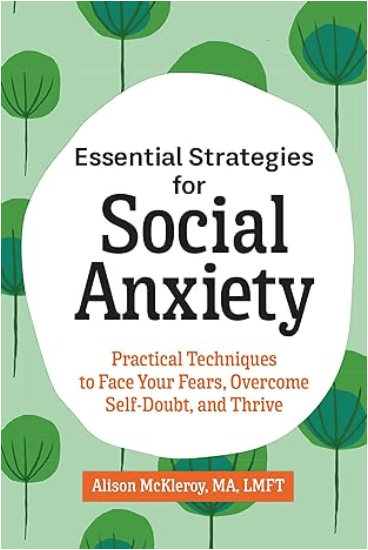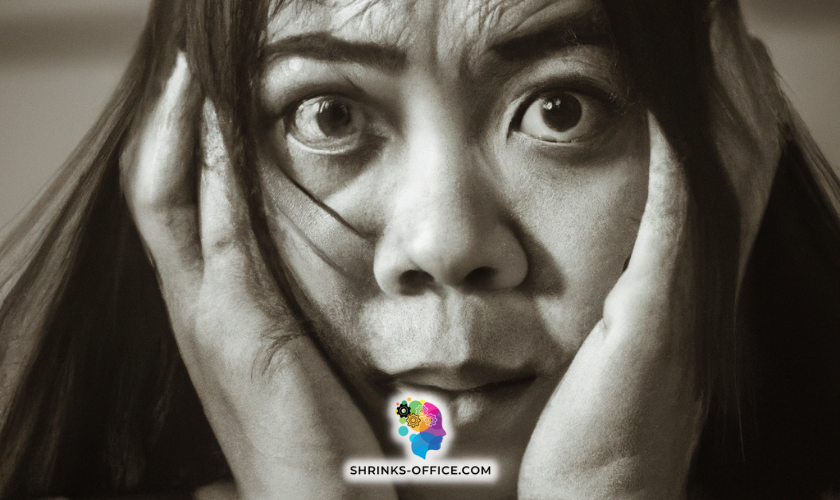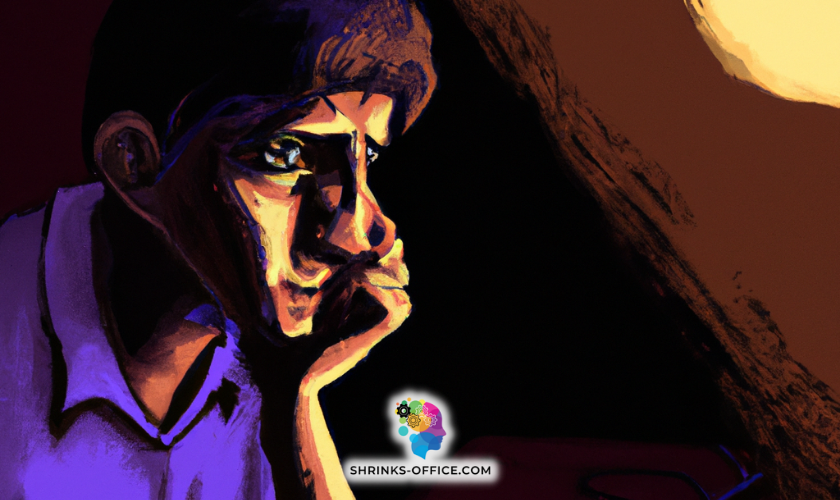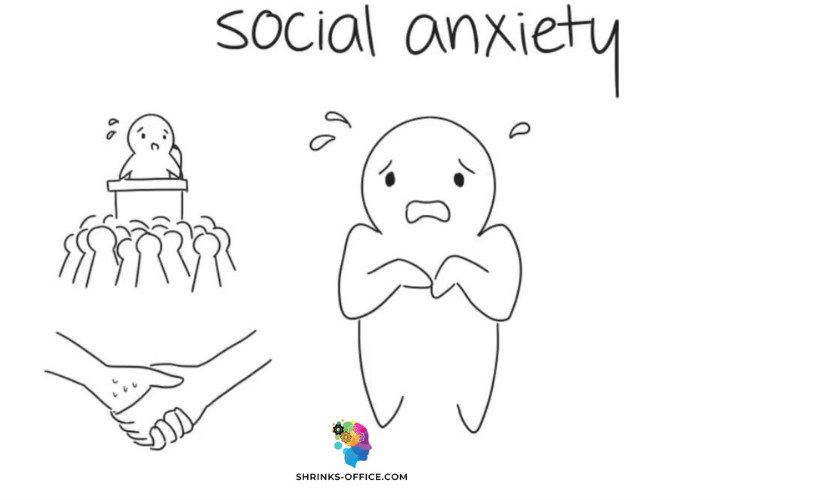Can Anxiety Cause Psychosis? | The Link Between Mental Health & Wellness
Can Anxiety Cause Psychosis?
No, anxiety itself does not directly cause psychosis. However, severe or prolonged anxiety can contribute to conditions or states of mind where someone might experience symptoms that are similar to psychosis.
Anxiety
Anxiety is a mental health condition characterized by feelings of worry, anxiety, or fear that are strong enough to interfere with one's daily activities. Examples of anxiety disorders include panic attacks, obsessive-compulsive disorder, and post-traumatic stress disorder.
Psychosis
Psychosis is a serious mental disorder characterized by a disconnection from reality. People experiencing psychosis may have hallucinations (seeing or hearing things that are not there) or delusions (firmly held beliefs in things that are not true). Their thoughts and speech might be disorganized, making it hard to understand them.
Symptoms Of An Anxiety-Induced Psychosis
- Hallucinations
- Delusions
- Paranoia
- Mania or mixed episodes
- Disorganized speech and behavior
Treatment Of Anxiety-Induced Psychosis
- Cognitive behavioral therapy (CBT)
- Dialectical behavior therapy (DBT)
- Interpersonal Therapy (IPT)
- Family-oriented therapy
Can anxiety cause psychosis?
Anxiety disorder and psychosis are both mental disorders that can interrupt a person's life. Both can cause distress, confusion, and trouble for their sufferers. People often wonder if anxiety can lead to the symptoms of psychosis or vice versa. This article will examine the relationship between anxiety and psychosis in order to understand better how they may be connected.

What Is Anxiety?
Anxiety is an emotion characterized by feelings of worry, fear, unease, or dread. It is an evolutionary adaptation that helps us identify and respond to danger. Anxiety can be short-term when it is an appropriate reaction to a stressful event or long-term in the case of childhood trauma.
When it becomes a chronic condition, having an anxiety attack affects daily functioning. Anxiety disorders include social anxiety disorder, obsessive-compulsive disorder (OCD), panic disorder, post-traumatic stress disorder (PTSD), and generalized anxiety disorder (GAD).
What is psychosis?
Psychosis is characterized by altered thinking, behavior, and perception. People with psychotic disorders may experience delusions, hallucinations, disorganized speech or behavior, and impaired cognitive functioning. The most common psychotic disorders are schizophrenia and schizoaffective disorder. People with psychosis often lack insight into their symptoms and may be unaware that their beliefs and perceptions are distorted.
Treatment is often necessary to help manage symptoms, reduce the risk of relapse, and promote recovery. In short, Psychosis is a symptom and not an illness. Psychosis can be triggered by extreme stress, trauma, or a mental or physical illness.
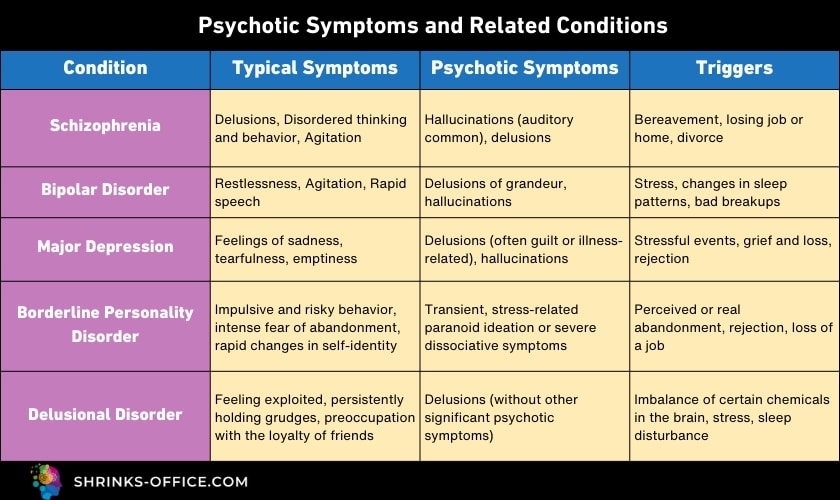
The relationship between anxiety and psychosis
Studies have shown that anxiety is closely linked to psychosis. [1] People with anxiety disorders and major depression are more likely to develop some serious mental illness, like psychotic disorders, including schizophrenia, bipolar disorder, and schizoaffective disorder. In fact, around 27% of patients with Anxiety and Depression show one or more psychotic symptoms. [1] And those who show psychotic symptoms tend to have a more severe Anxiety/ Depression condition.
Psychosis and anxiety can have a complex relationship. In some cases, psychosis may lead to depressive and anxiety disorders which can also be triggered by a mental illness. [3] This is especially true for young adults and people with schizophrenia and bipolar disorder, as episodes of psychotic symptoms can be very frightening and stressful. On the other hand, having a problem with mental health issues such as Anxiety or Depression can put someone at greater risk of developing a psychotic disorder.
People with Major Depressive Disorder may be more likely to experience hallucinations and delusions due to changes in brain chemistry.[2]

Symptoms of anxiety-induced psychosis
Other than anxiety-related symptoms, people who suffer from anxiety disorder may also have a depressed mood and show psychiatric symptoms such as;
- Hallucinations
- Delusions
- Paranoia
- Mania or mixed episodes
- Disorganized speech and behavior
In severe cases, people with anxiety may experience auditory or visual hallucinations, delusions of persecution/ grandeur, paranoia, or mania. This could be a sign that their anxiety has progressed to a psychotic disorder such as schizophrenia. People who suffer from extreme stress often struggle to control their thoughts and feelings, making it difficult to differentiate between reality and delusions.
If anxiety attacks are left untreated, anxiety-induced psychosis can lead to greater social isolation, major depressive disorders, and suicidal ideation.

Treatment options
To manage the symptoms of anxiety-induced psychosis, psychiatrists generally prescribe medications like antidepressants or antipsychotics. Additionally, psychotherapy can be instrumental in supporting those living with this disorder. Examples include:
- Cognitive behavioral therapy (CBT)- This is an incredibly effective form of treatment that assists an individual in recognizing and transforming any unhelpful thinking patterns. We suggest online therapy for convenience.
- Dialectical behavior therapy (DBT)- This is a powerful technique to assist people dealing with intense emotions, including those stemming from anxiety-related psychosis.
- Interpersonal Therapy (IPT)- This is an effective treatment that enables individuals to comprehend the interpersonal relations in their life and how they might be contributing to psychological distress. By doing this, IPT can help those struggling with anxiety-induced psychosis gain a better handle on their mental health.
- Family-oriented therapy - This is an approach to psychotherapy aimed at enhancing family dynamics and promoting meaningful conversation. It can reduce overall stress levels in the home, forming a more conducive atmosphere for individuals struggling with anxiety-induced psychosis to recover effectively.
Conclusion
Psychosis is often seen as a severe condition in anxiety sufferers. Hence, it should be addressed before it becomes unmanageable. The right treatment plan should be tailored to the individual’s needs. Additionally, you can seek help from online therapy services and support groups or engage in self-care activities to help manage anxiety and reduce the risk of psychosis. With proper treatment and care, anxiety-induced psychosis can be managed, and you can lead a healthier and better life.
FAQ
Which type of anxiety causes psychotic behavior?
Psychotic episodes are only seen in severe panic attacks.[4] However, once the patient enters a state of psychosis, it can reoccur 10 to 15 times per day. Further, psychotic symptoms can worsen the anxiety symptoms, leading to further distress and possible hospitalization.
How do I know if I have anxiety or psychosis?
The truth is, you can not easily distinguish between the two. Psychosis and anxiety share common symptoms, such as insomnia, restlessness, racing thoughts, or feeling overwhelmed. If you’re experiencing any of these problematic anxiety symptoms, it’s important to seek help from a professional who can assess your situation and provide the treatment you need.
References
- Evidence That Psychotic Symptoms Are Prevalent in Disorders of Anxiety and Depression
- Brain changes in depression - PMC
- Frontiers | Case report: From anxiety disorders to psychosis, a continuum in transitional age youth?
- Panic attacks with psychotic features - PubMed
⚠️ Disclaimer: The content of this article is for informational purposes only and is not a substitute for professional medical advice or treatment. Consult a qualified health professional for any medical concerns.

